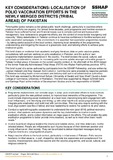| dc.contributor.author | Hakeem, Luqman | |
| dc.contributor.author | Hussain, Riaz | |
| dc.coverage.spatial | Pakistan | en |
| dc.date.accessioned | 2022-09-08T08:57:16Z | |
| dc.date.available | 2022-09-08T08:57:16Z | |
| dc.date.issued | 2022-09-08 | |
| dc.identifier.citation | Hakeem, L. and Hussain, R. (2022). Key Considerations: Localisation of Polio Vaccination Efforts in the Newly Merged Districts (Tribal Areas) of Pakistan, Social Science in Humanitarian Action Platform (SSHAP) (SSHAP), DOI: 10.19088/SSHAP.2022.035 | en |
| dc.identifier.uri | https://opendocs.ids.ac.uk/opendocs/handle/20.500.12413/17621 | |
| dc.description.abstract | Poliomyelitis (polio) remains a vital global public health challenge, particularly in countries where eradication efforts are ongoing. For almost three decades, polio programme and frontline workers in Pakistan have suffered human and financial losses due to complex political and bureaucratic management, local resistance to programme efforts, and the context of cross-border insurgency and insecurity.1 Many stakeholders in Pakistan continue to have low confidence in frontline workers and polio vaccination campaigns. In this environment, it is essential that vaccination programmes localise – by taking careful account of the local context, improving local ownership of the programmes, understanding and mitigating the issues at a grassroots level, and tailoring efforts to achieve polio eradication goals.
This brief draws on evidence from academic and grey literature, data on polio vaccine uptake, consultations with partners working on polio eradication in Pakistan, and the authors’ own programme implementation experience in the country. The brief reviews the social, cultural, and contextual considerations relevant to increasing polio vaccine uptake amongst vulnerable groups in Pakistan’s tribal areas. It focuses on the current country context, in the aftermath of the 2018 merger of the former Federally Administered Tribal Areas (FATA) into Khyber Pakhtunkhwa province (KPK).
This brief is part of a series authored by participants from the SSHAP Fellowship, and was written by Luqman Hakeem and Riaz Hussain from Cohort 2. Contributions were provided by response partners in Pakistan including health communication and delivery staff and local administrative authorities. This brief was reviewed by Muhammad Sufyan (University of Swabi) and Ilyas Sharif (Quaid-e-Azam College of Commerce, University of Peshawar). The brief was supported by Megan Schmidt-Sane and Santiago Ripoll at the Institute of Development Studies and is the responsibility of SSHAP. | en |
| dc.description.sponsorship | Wellcome Trust | en |
| dc.description.sponsorship | Foreign, Commonwealth & Development Office (FCDO) | en |
| dc.language.iso | en | en |
| dc.publisher | SSHAP | en |
| dc.rights.uri | http://creativecommons.org/licenses/by/4.0/ | en |
| dc.subject | Health | en |
| dc.title | Key Considerations: Localisation of Polio Vaccination Efforts in the Newly Merged Districts (Tribal Areas) of Pakistan | en |
| dc.type | Series paper (non-IDS) | en |
| dc.rights.holder | SSHAP | en |
| dc.identifier.doi | 10.19088/SSHAP.2022.035 | |
| dcterms.dateAccepted | 2022-09-08 | |
| rioxxterms.funder | Default funder | en |
| rioxxterms.identifier.project | Default project | en |
| rioxxterms.version | VoR | en |
| rioxxterms.versionofrecord | 10.19088/SSHAP.2022.035 | en |
| rioxxterms.funder.project | 9ce4e4dc-26e9-4d78-96e9-15e4dcac0642 | en |


